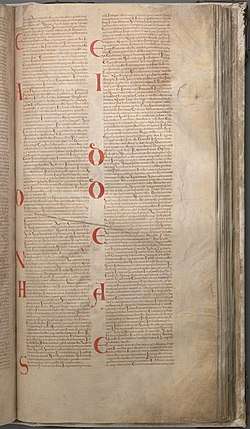Luke 17
Luke 17 is the seventeenth chapter of the Gospel of Luke in the New Testament of the Christian Bible. It records the teachings of Jesus Christ and the healing of ten lepers.[1] The book containing this chapter is anonymous, but early Christian tradition uniformly affirmed that Luke composed this Gospel as well as the Acts of the Apostles.[2]
| Luke 17 | |
|---|---|
 The Latin text of Luke 14:30–19:7 in Codex Gigas (13th century). | |
| Book | Gospel of Luke |
| Category | Gospel |
| Christian Bible part | New Testament |
| Order in the Christian part | 3 |
Text
The original text was written in Koine Greek. This chapter is divided into 37 verses.
Textual witnesses
Some early manuscripts containing the text of this chapter are:
- Papyrus 75 (175-225)
- Papyrus 111 (3rd-century)
- Codex Vaticanus (325-350)
- Codex Sinaiticus (330-360)
- Codex Bezae (~400)
- Codex Washingtonianus (~400)
- Codex Alexandrinus (400-440)
Offences and forgiving of offences (17:1–10)
"Offences", literally "stumbling blocks" (Greek: τα σκανδαλα, skandala).[3]
Cleansing ten lepers (17:11–19)
_-_James_Tissot_-_overall.jpg)
This is one of the miracles of Jesus in the Gospels (only in the Gospel of Luke).[4][5] On his way to Jerusalem, Jesus traveled along the border between Samaria and Galilee. As he was going into a village, ten men who had leprosy met him. They stood at a distance and called out in a loud voice, "Jesus, Master, have pity on us!" When he saw them, he said: :"Go, show yourselves to the priests." And as they went, they were cleansed. One of them, when he saw he was healed, came back, praising God in a loud voice. He threw himself at Jesus' feet and thanked him—and he was a Samaritan. Jesus asked:
- "Were not all ten cleansed? Where are the other nine? Was no one found to return and give praise to God except this foreigner?"
Then he said to him:
- "Rise and go; your faith has saved you."
This miracle has been described as emphasising the importance of faith, for Jesus did not say: "My power has saved you" but attributed the healing to the faith of the beneficiaries.[6][7]
The coming of the kingdom (17:20–37)
Verse 20
Verse 21
- Neither shall they say, Lo here! or, lo there! for, behold, the kingdom of God is within you.[9]
Lutheran biblical writer Harold Buls notes that the Pharisees' question is a 'when?' question whereas Jesus' answer is a 'what?' response: the Pharisees "were expecting the Kingdom of God ... to come soon"; this is "a faulty notion about the character of the Kingdom". Jesus replies that the Kingdom of God does not come "with observation" or "with a visible display":[10] the word Greek: παρατηρήσεως (paratērēseōs, careful observation) appears only here in the New Testament.[11]
See also
- Leper
- Lot
- Ministry of Jesus
- Miracles of Jesus
- Noah
- Samaritan
- The Kingdom of God is Within You
- Other related Bible parts: Genesis 6, Genesis 7, Genesis 19, Leviticus 14, Matthew 24
References
- Halley, Henry H. Halley's Bible Handbook: an Abbreviated Bible Commentary. 23rd edition. Zondervan Publishing House. 1962.
- Holman Illustrated Bible Handbook. Holman Bible Publishers, Nashville, Tennessee. 2012.
- Luke 17:1
- Bible Knowledge Background Commentary: Matthew-Luke by David C. Cook and Craig A. Evans (Feb 27, 2003) ISBN 0781438683 page 365
- Biblegateway Luke 17:11-19
- Berard L. Marthaler (2007) The creed: the apostolic faith in contemporary theology ISBN 0-89622-537-2 page 220
- Lockyer, Herbert, 1988 All the Miracles of the Bible ISBN 0-310-28101-6 page 235
- Luke 17:20 NKJV
- Luke 17:21 KJV
- Luke 17:20: ISV
- Englishman's Concordance, παρατηρήσεως
External links
- Luke 17 King James Bible - Wikisource
- English Translation with Parallel Latin Vulgate
- Online Bible at GospelHall.org (ESV, KJV, Darby, American Standard Version, Bible in Basic English)
- Multiple bible versions at Bible Gateway (NKJV, NIV, NRSV etc.)
| Preceded by Luke 16 |
Chapters of the Bible Gospel of Luke |
Succeeded by Luke 18 |